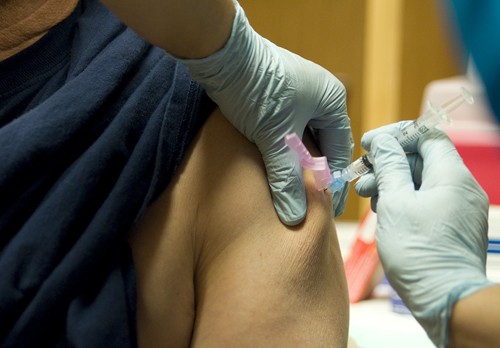More than 300 of Tucson’s homeless and underserved will be protected against influenza this year, thanks to the UA Student Health Advisory Committee.
The UA Student Health Advisory Committee, in collaboration with El Rio Community Health Center, established its first vaccination clinic at Hope Fest on Saturday.
Hope Fest is an annual gathering of community and governmental organizations held at Tucson Electric Park. The event provides medical services, dental services, haircuts, clothing, food and other resources to the homeless and underserved community.
The Student Health Advisory Committee purchased 310 influenza vaccines for the event, which were administered by registered nurses. Committee volunteers at Hope Fest led attendees to various medical services, including vision screenings, blood pressure testing and diabetes testing. The committee also donated 2,400 cans of food, clothing and books to the event.
“”What we’re doing for (the underserved) is making so much of a difference,”” said pre-physiology freshman Lucy Shi, the grants, donations and fundraising chair for Student Health Advisory Committee. “”I’m going to remember this experience for the rest of my life.””
Emile Gordon, co-director of Student Health Advisory Committee and a junior majoring in microbiology, molecular and cellular biology, and human physiology and anatomy, began planning the initiative over the summer. He originally wanted to vaccinate the homeless at local shelters but was stopped by legal restrictions. The committee collaborated with El Rio Community Health Center, who participated in Hope Fest in the past, to introduce the service.
“”It was a lock-and-key fit,”” Gordon said.
Gordon had never participated in the event but was impressed by its mission.
“”I couldn’t believe it,”” Gordon said. “”Not one organizer gets paid.””
Several grants and money from the Associated Students of the University of Arizona funded the vaccinations, which cost about $13 each. The committee hopes to provide an increasing number of vaccinations each year.
“”On the whole, I think it helps a lot of people,”” Gordon said. “”We want to make this an annual endeavor.””
The vaccinations also benefit the rest of the population by preventing the spread of the illness.
“”We’re definitely helping out the community in general,”” Shi said. “”We’ve targeted such a bigger scope than the number of vaccinations.””
Yaritza Vazquez, 14, came to Hope Fest with her cousins.
“”We came with our parents because they needed to get their teeth fixed,”” Vazquez said.
The family used many of the resources at the event.
“”We got food and diapers and stuff,”” said Ashley Candelario, 17.
Vazquez used some of the medical services, including the influenza vaccine provided by Student Health Advisory Committee.
“”I’m getting my vision screening and flu shot,”” she said, “”To not get sick.””
Vazquez said she appreciated the free services.
“”It’s pretty cool,”” Vazquez said.
Hope Fest provides many other medical resources for the homeless and underserved. All services are donated by local organizations.
“”They can get (the services) elsewhere, but this is an opportunity to get a variety of services at the same time,”” said Dale Berg, campus director for Pima Medical Institute. The institute has participated in Hope Fest for several years and serves between 500 and 700 patients each time.
Berg said individual attention is crucial in health care.
“”With the one-on-one student involvement, we see less tempers,”” Berg said. “”They have someone helping them through this maze.””
Shi said students also learned from the experience.
“”We’re talking to them and getting a human connection behind this whole experience.””









